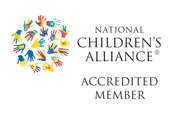The need for communication this holiday season
December 13, 2020
For many, this year’s holiday season has dramatically shifted away from the norm. Whether this means more work, or less, it undoubtably causes stress. While the holiday season is often one of joy, sharing, family and love, many children and families who have experienced trauma face additional challenges. The realities of many types of loss, combined with the whirlwind and varying impacts of COVID-19, may make it difficult to see the wonder of the season. However, there are ways to make this holiday season meaningful, less stressful, and joyful this year.
As with any topic that causes anxiety, the first step is to talk about it. Depending on if you have very young children who don’t understand all the differences this year may bring, or you have older children who do, this conversation may be very different. For young children, it may not involve them more than simply explaining that some traditions may be different. The details don’t matter as much as clearly communicating and then adding in something they will get to experience as an excitement. For older children, it may be helpful for your family to talk about how everyone is feeling. Understanding and communicating fears, hopes, frustrations and anticipation may help everyone come together for a common goal. Perhaps there are traditions that can be continued that will mean even more. There may be something that holds an importance you hadn’t realized. Or, if there are some things that just can’t happen, or can’t be fixed, expressing your sadness and frustration may help your children reconcile their own feelings. Communication and transparency can help the connection with your children and move toward the things that bring joy.
To support your children in the holiday season, you must first support yourself; much like the oxygen mask on an airplane, if you can’t breathe, you can’t help another.”
Another critical component this season is self-care. Parents and caregivers often take on the frustration, anger, sadness and disappointment of their children during loss, trauma and grief. For those with younger children, the realization of what your children are going to miss out on feels like an extra burden when making what they can experience that much more special. To support your children in the holiday season, you must first support yourself; much like the oxygen mask on an airplane, if you can’t breathe, you can’t help another.
Carve out time for yourself, identify what is going to make you happy and help you relax. Don’t put this off! Self-care practices are often the first to go after what can be even a minor inconvenience. Identify at least one activity (something you do, not take, eat or drink) that calms you down, releases anxiety or frustration, and practice it daily. Double doses of self-care are recommended. Talk with your partner, family or friends about what you look forward to in the holiday season and find something you know will bring you joy.
The National Child Traumatic Stress Network has put together a guide for parents in navigating this holiday season with children and teens. Their resources, suggestions and tools may help you find that “ah-ha!” moment in supporting your family’s holiday.
Happy Holidays from all of us at Children’s Cove






